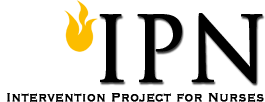About Us
The mission of IPN is to ensure public health and safety by providing education, monitoring, and support to nurses in the State of Florida.
IPN History
The Intervention Project for Nurses (IPN) was established in 1983 through passage of legislation. IPN is one of Florida’s designated Impaired Practitioner Programs (IPP). IPN under contract with the Florida Department of Health (DOH) provides state-wide education, support and monitoring to nurses with impairing conditions such as substance use disorders, psychiatric and physical conditions. Nurses are most often referred to IPN by nursing employers due to potential safety to practice concerns.
For non-nursing healthcare practitioners, DOH contracts with the Professional Resource Network (PRN) to provide similar services. Florida statute 456.076 provides legislative authority for both IPN and PRN.

Program Objectives
- To protect health, safety and welfare of the public, as risks to patients increase when a nurse providing care has an active impairing condition.
- To offer consultation and educational programs to encourage earlier identification and action when fitness to practice concerns are present.
- To provide support and monitoring to nurses appropriate for IPN while assisting each to maintain professional licensure.
- To supply a cost-effective avenue to help nurses as an alternative to the traditional disciplinary process.
- To retain nurses in the nursing profession.
What is an initial IPN-facilitated evaluation and who conducts these evaluations?
The majority of nurse’s referred to IPN must engage in an individual independent medical evaluation conducted by an IPN-approved evaluator who is qualified to evaluate the nurse in the area of concern. To become an IPN-approved evaluator, a physician must submit a detailed application verifying they are able to meet the standards required to be able to conduct a comprehensive evaluation of a healthcare professional. The majority of the physicians are Board Certified in their specialty, in areas such as addiction medicine, psychiatry and/or psychological and neurocognitive testing. These evaluators must attend an annual day-long training sponsored by IPN and PRN to maintain their approval.
The independent medical evaluation typically comprises of an extensive interview with the referred nurse, review of referral documentation and other pertinent documents provided by IPN and/or provided by the nurse, Psychometric Testing, toxicology testing, gathering of collateral information from third party individuals such as the nurse’s previous employer, colleague or family member; and, additionally, psychological and/or neurocognitive testing may be included as part of the evaluation, if clinically warranted.
How much does IPN Monitoring Cost?
IPN does not charge a monitoring fee however, nurses are charged an annual $50 Recovery and Wellness fee for modules they complete in nurse support group which can be used for ongoing continuing education credits toward their licensure renewal.
IPN participants are also responsible for all payments to third parties associated with their monitoring. For example, each nurse is responsible for paying for their initial independent medical evaluation, treatment interventions, random toxicology testing, weekly nurse support group, and fees associated with individual therapy and/or medication management, if applicable in their case.
Who can make a report to the Intervention Project for Nurses (IPN)?
Any person suspecting impairment of a nurse’s ability to provide safe nursing care may report this nurse to the Florida Department of Health (DOH) and/or IPN. Under Florida’s Mandatory Reporting Law, all licensed nurses must report any suspected impairment in practice to DOH and/or IPN.
What is the timeframe it takes for a nurse to be returned to practice after being referred to IPN?
A specific timeframe to return to practice after a nurse is referred to IPN cannot be determined initially, as each case is very individualistic.
The timeframe for return to work is determined by multiple factors, to include the initial evaluation process, the length of the treatment program (if a treatment intervention is indicated), and the recommendations for return to work from the nurse’s treatment providers. A more specific time frame can be provided to nurse or employer post IPN evaluation and/or treatment completion. Many nurses are cleared to return to work once they have completed treatment and have executed a monitoring Contract.
What are IPN’s expectations of a worksite monitor who is supervising an IPN nurse in the workplace?
Worksite Monitors, also called employment supervisors, are key components of the accountability and support network a nurse has under IPN Monitoring. Once a nurse is cleared to return to practice, they begin their job search or return to their previous place of employment if their job is being held for them.
When employment is obtained, the nurse is expected to provide their employment supervisor with a copy of their IPN Monitoring Contract.
The nurse will then inform their Case Manager that they have obtained employment and execute a release for their employment supervisor. The IPN Case Manager must have contact with the employment supervisor prior to the nurse’s work start date, to include orientation. The Case Manager will confirm the supervisor has a copy of the nurse’s Contract and review the nurse’s employment expectations and restrictions. Case Manager may discuss any other individualized work parameters such as limits to overtime work, and controlled substance access restriction, if applicable.
After this initial phone call, the worksite monitoring/supervisor is responsible for completing quarterly work performance evaluations which provides IPN with a basic snapshot of how the nurse is performing during each quarter. Other than completing the one-page work performance evaluation quarterly, we ask that supervisors contact the nurse’s Case Manager directly if concerns or questions ever arise.
Does every nurse referred to IPN end up under IPN monitoring?
In short, no; not every nurse that is referred to IPN ends up needing IPN monitoring. IPN receives reports and referrals from many sources. The Board of Nursing may refer a nurse for an IPN-facilitated evaluation to determine whether the nurse is struggling with an impairing condition. The nurse will engage in the evaluation and the evaluator may determine that there is no impairing condition, and the nurse is safe to practice, thus, there is no need for IPN monitoring.
IPN then informs the Board of Nursing that the nurse has complied with the evaluation and was found to have no impairing condition and is able to return to nursing practice with reasonable skill and safety without the requirement of IPN Monitoring.
